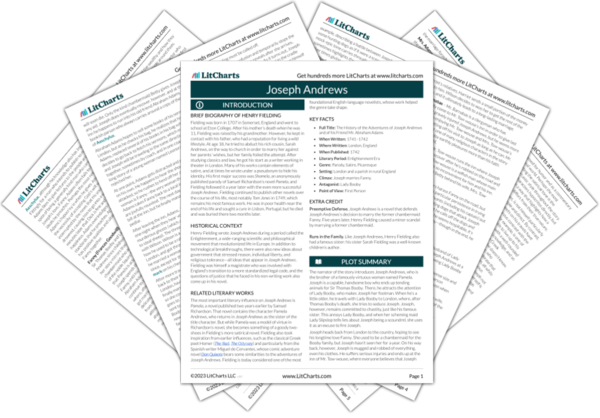Parson Abraham Adams is known for always carrying around a book by the ancient Greek playwright Aeschylus, which he’s had for 30 years. The book hints at Adams’s studious and bookish nature, but it also symbolizes his hypocrisy, suggesting that Adams’s supposed love of education might be shallower than it appears. Despite Adams’s great affection for Aeschylus, he doesn’t seem to read much outside of Aeschylus, suggesting an unwillingness to branch out and seek a more well-rounded education. Adams also hypocritically says that religious men have little to learn from plays, despite the fact that Aeschylus is a playwright. This shows how, while Adams purports to believe in education and preaches about it, his own education is selective and not always consistent. As is often the case, Adams finds it difficult to practice what he preaches.
Adams’s book of Aeschylus meets its end when Adams gets distracted during Joseph Andrews and Fanny’s reunion, and the book burns up. The burning of Aeschylus is ambiguous—on the one hand, it’s yet another example of Adams’s absent-mindedness and carelessness. On the other hand, however, perhaps the burning of Aeschylus represents a new start for Adams, since in the end, the best thing Adams does as a preacher is to help bring about Joseph and Fanny’s wedding.
Aeschylus Quotes in Joseph Andrews
As soon as he had seated himself, the stranger began in these words: “Sir, I do not care absolutely to deny engaging in what my friend Mr Barnabas recommends; but sermons are mere drugs. The trade is so vastly stocked with them, that really, unless they come out with the name of Whitefield or Wesley, or some other such great man, as a bishop, or those sort of people, I don’t care to touch.”
For as soon as the first tumults of Adams’s rapture were over he cast his eyes towards the fire, where Aeschylus lay expiring; and immediately rescued the poor remains, to wit, the sheepskin covering, of his dear friend, which was the work of his own hands, and had been his inseparable companion for upwards of thirty years.












